Fire Above, Fire Below Read online
The author and publisher have provided this e-book to you without Digital Rights Management software (DRM) applied so that you can enjoy reading it on your personal devices. This e-book is for your personal use only. You may not print or post this e-book, or make this e-book publicly available in any way. You may not copy, reproduce, or upload this e-book, other than to read it on one of your personal devices.
Copyright infringement is against the law. If you believe the copy of this e-book you are reading infringes on the author’s copyright, please notify the publisher at: us.macmillanusa.com/piracy.
Contents
Title Page
Copyright Notice
Begin Reading
The bubbling tarmac on the lower level of the car park below the office block was the first sign, but no one noticed it, because there was no one parked there at midnight on a Friday night. The second sign was the smoke curling and twisting through the expansion joints of the concrete pillars. No one noticed this either, because the car park attendant was four levels up, and fast asleep in his booth.
The third sign could not be missed, as the tarmac reached a critical temperature and exploded into fire, fire that leaped to the nearer vehicles and set their gas tanks off one after another like fireworks, for the fire was already far, far hotter than it should have been.
Sensors sent their warning even as they melted, and the sprinkler system worked for a full thirty seconds before the heads and pipes turned to slag and dripped from the ceiling.
The fire raced through the level above, exploding more cars as it passed. The attendant saw his CCTV monitors flash yellow and orange and white and go blank in a second. He reached for the phone to call it in, but his instincts were good, and as the monitors for two levels below him flared and died at the same time, and he felt the first flush of the wave of superheated air from below, he dropped the phone and ran from the booth instead, sprinting up the ramp as the fire bells chattered, high and sharp above the bass boom of exploding cars.
The attendant kept on running when he got outside, which saved his life. He was around the next corner, panting like a fish snatched from water, when the fire roared up from the car park into the building, and within a minute, turned it into a torch fifteen stories high.
Later analysis showed the time from the first radiant heat detector trip in the lowest car park floor to the immolation of the entire building was six and a half minutes. The first firefighting unit was on the scene in seven and a half minutes, but there was nothing they could do, save to try and establish a perimeter to stop the fire from spreading. This, with the help of seventy other units, eighty trucks, three hundred sixty firefighters, and eight million gallons of water, they eventually managed to do, though the core fire within the rubble of the building continued to burn throughout the night and well into the next day.
Three people died in the fire. Two cleaners in an office on the twelfth floor; and one firefighter, who had a heart attack as he put on his breathing apparatus. But everyone knew if the fire had happened on a working day, there would have been at least a thousand dead. The fire was so hot and so fast there would have been no chance of evacuation.
Even before the forensic teams had finished sifting the twisted, ruined remnants of concrete and steel, the fire chief called an emergency meeting with the mayor. Unusually, the chief requested they meet on the roof of Ladder Company Number One’s firehouse, one of the oldest public buildings in the city, a six-story gothic revival tower of black stone that squatted darkly between two gleaming new skyscrapers of glass and shining steel.
The mayor thought it must be for some PR gimmick, and was surprised when he found the chief alone, without a television crew or reporters. The mayor had a troupe of PR advisors, aides, and followers himself, all lined up behind him.
The chief was waiting by the door at the top of the stairs, which was shut. He shook hands with the mayor and said, “Send your people back down, please, sir. We need a few minutes private discussion, and there’s something you need to see up here.”
The mayor shrugged and sent his assembled flackery back downstairs. The chief waited till they were gone, then opened the door to the roof and escorted the mayor outside.
“What’s this about, Hansen?” growled the mayor.
“The Oldgate building fire,” replied the chief. He pointed at the small shed over on the corner of the roof. It had chicken wire walls and a corrugated iron roof, and pigeons were roosting on top of it. “Let’s go over there.”
“What’s the Oldgate fire got to do with a pigeon house?” asked the mayor suspiciously.
“Nothing directly,” said the chief. He led the way, shooing some pigeons off so he could open the door. “But there is something you need to know about the fire.”
“Listen, your people said it was some kind of one-in-a-thousand gas main explosion. We told the media it was a gas explosion! Why do you need to drag me up to a pigeon house to tell me anything different?”
“I wanted to show you something,” said the chief. “Which happens to be here, with the pigeons.”
He brushed the straw from the floor to reveal a trapdoor fastened with a big brass padlock. He opened this with a key he wore on a chain around his neck. The key was iron, big and old, and the mayor thought it must be damned uncomfortable to have it hanging around your neck. He began to wonder about the sanity of his fire chief.
Then the chief opened the trapdoor, and the mayor began to wonder about his own sanity. Under the trapdoor was a cavity, and curled up on a bed of gold twenty-dollar pieces, there was a small dragon. Its eyes were closed, but its scaly, scarlet chest slowly rose and fell, suggesting it merely slept.
“What the hell is that?” asked the mayor.
“A messenger,” said the chief. “Listen, did your predecessor ever talk to you about … the Dragonborn?”
The mayor scowled and looked around. Then he looked down at the small, sleeping dragon.
“Yeah,” he said reluctantly. “I thought he’d gone senile. Something about people who were half dragon and half human, and they’d done a deal with the city a long time ago. I don’t remember all of it.”
“We do,” said the chief. “Everyone here in Ladder Company Number One remembers. You ever wonder why, if you look at any chief’s record, they always did time with Ladder Number One?”
“No, why the hell would I?” asked the mayor. “And what’s with this Dragonborn thing?”
“First things first. The fire, the Oldgate building inferno. A dragon started it—”
“What!?”
“Let me finish. A dying dragon started the fire. It would have been coming up from the hot center of the earth for its final flight. Only it didn’t make it. Now it’s stuck down there, and until we get rid of it, it’s going to cause more fires. Very intense, very fast fires, like the one last week. It could destroy a lot of the city.”
“So sort it out,” said the mayor. He took off his hat and wiped his forehead. Even this talk of very hot fires made him sweat, and the thought of another one like the Oldgate fire … It would finish his chances for reelection. Plus, a lot of people might die.
“Even with our most advanced suits, chiller technology, the works, we can’t get anywhere close enough to a dying dragon to deal with it,” said the chief. “But one of the Dragonborn could. It’s what they do.”
“So what’ll it cost?” asked the mayor reluctantly. “Your budget is already over—”
“There’s a small amount of gold involved, nothing significant,” said the chief. “The most important thing is that we have to reaffirm the pact. The mayor and the fire chief together. We personally guarantee it, with our lives.”
“The what? What pact?”
&n
bsp; “The agreement between the city and the Dragonborn,” replied the chief evenly. He was taller than the mayor, and had to look down at him for their eyes to meet. This reinforced the politician’s suspicion that the firefighter didn’t think much of him as the leader of his city. “Two hundred years back, the mayor and the head of what was called the Fire Watch agreed with a representative of the Dragonborn that we would keep their secret, protect them if necessary from our citizenry, and in return they would deal with any dying dragons who came up from beneath the earth.”
“Bullshit!” exclaimed the mayor. “You’re making this up! The dragon thing there, some film studio made it—”
“No,” said the chief. “You’ll see when we wake it.”
“There are no dragons,” said the mayor. “You said a gas main—”
“The last time we called on the Dragonborn was thirty-three years ago,” said the chief. “You would have been what, twenty-five or so? You remember?”
The mayor looked across to the west, to the buildings lining the river. They didn’t look sleek and new now, but none were more than thirty years old. There had been tenement buildings there before, huddled together against the mudflats. They had all burned one terrible day thirty-three years before, with tremendous loss of life.
“Yeah,” he said slowly. He could never forget the columns of smoke boiling up, the great mantle of darkness upon the city, the ash falling like black snow …
“That was a dragon,” said the chief. “One too tired and old to make it to the surface. The fires were its last attempts to get through. They would have kept burning, constantly getting hotter and more widespread, except Chief Gramowitz and Mayor Tell called in the Dragonborn.”
“OK,” said the mayor. He knew when he had to face up to something, when it could not be swept under the carpet or smothered in spin. It was one of his virtues as a politician—he would accept tough realities when there really was no alternative. “How do we do this?”
The chief took a folding knife out of his pocket and opened it. The mayor watched the fireman’s eyes, and instinctively turned sideways a little, ready to brawl. He’d grown up with knife fights, and the muscle programming was still there forty years after it had been necessary. He had scars to show as well, evidence of hard lessons never to be forgotten.
The chief sliced the end of his thumb and held out the knife, handle first, to the mayor.
“A few drops of blood from the chief and the mayor,” he said. “We drip it on the dragon’s snout.”
“This going to give it a taste for human blood?” asked the mayor, still suspicious. “My blood?”
“It’s ceremonial,” said the chief. He held his thumb near the dragon’s head and let the drops fall, red splashes on the gold.
The mayor held the knife, but didn’t cut his thumb. The dragon moved, its wings flexing a little, as if it were waking from a long and restful sleep. A scarlet tongue, forked like a snake’s, flickered out of a mouth only slightly ajar and licked the blood.
“Quickly!” ordered the chief.
The mayor moved. The knife was much sharper than he expected, and he sliced his thumb to the bone, so deep he cried out and dropped the knife. But he repressed the pain and held his thumb against the chief’s, their nails touching, and both bled straight into the dragon’s rapidly widening mouth.
The creature continued its yawn, gulped a few times, then closed its jaws with a sound like the harsh snap of a mousetrap, making both men jump. At the same time, it opened its eyes, bright golden eyes with no visible pupil at all.
“We call upon the Compact,” said the chief. He sounded nervous, which surprised the mayor, till he considered this was as far outside the other man’s experience as his own.
“Yeah, we call upon the Compact,” added the mayor.
The dragon lidded its eyes twice, arched its back, and spread its wings. The men stepped back to give it room. The creature made a noise rather like the coughing bark of a seal, and shot a small, multicolored flame out of its crocodilian nostrils. Then it launched itself up and dove straight into the dark stone of the corner buttress. For a moment a red and gold imprint remained on the stone, a fading afterimage of its passage.
“Where did it go?” asked the mayor. He was holding his thumb tight to stop the bleeding.
“Into the stone, and down,” said the chief. “The firehouse is clad in sixteen-inch granite blocks, and built on foundations of stone down to the bedrock.”
“So what happens now?”
“A Dragonborn will come,” said the chief. “Here to the firehouse, within three days.”
“Where from?”
“I don’t know,” said the chief. “You’d better get your cut seen to. We’ll tell them you did it on the glass on the parapet.”
He took a slim radio handset from under his jacket.
“Ten thirty-seven on the roof, Connie. Nothing serious. Send someone up with an aid kit.”
* * *
The Dragonborn arrived the next afternoon, which was earlier than expected. Though the chief had half expected someone to fly in and land on the roof, or emerge from the stone of the firehouse, the Dragonborn actually turned up in a cab and the first he knew about it was when his assistant brought in her card.
“There’s a woman to see you,” said Connie. “Said she has an appointment, but she’s not on your schedule.”
The chief looked at the card. It was printed in a raised, metallic red ink and simply had the name Ylane Smith on it, an e-mail address, and in the corner, a symbol. It took him a moment to realize it was a stylized version of the messenger dragon he and the mayor had sent from the pigeon house.
“Ah, yes,” he said. “Please send her in.”
“OK,” said Connie. “Buzz if you need rescuing. We already had to give oxygen to some of the boys downstairs.”
“What!?” asked the chief.
“You’ll see,” said Connie dryly, and left.
Ylane Smith came in, and the chief realized what Connie meant. The Dragonborn—which is what he presumed she was—was very tall, strikingly beautiful, had skin the color of polished bronze, and as far as he could tell, was only wearing a long, loosely buttoned alligator-skin trench coat, with nothing underneath. She looked like an exotic model who’d just stepped off the catwalk, right up until she took off her big dark glasses and he saw her eyes.
She had exotic eyes, too, but they did not add to her beauty. Though almond shaped and lined with long lashes, her eyes were entirely smooth, shining gold, without iris or pupil.
“Fire Chief Erik Hansen,” said the Dragonborn. “You have called upon the Compact.”
“Yes,” said the chief. “Yes, uh, Miss Smith.”
“Call me Ylane,” said the Dragonborn. She crossed the room and looked at the photographs on the wall. Some were of the Causeway fires. Then she moved to the map of the city. In the old days it had been constantly replaced and updated, but since the department went electronic the chief hardly ever looked at it, and it was at least three years old. “The Smith part is just to have something on there. Where is the dragon?”
“Let me … let me show you on the screen, here,” said the chief. He started to swivel his monitor around, but Ylane held up one perfectly manicured hand. Her nails were gold, too, he noted, long and sharp.
“No. On this map. We cannot see illuminated images well.”
“Yes, yes, of course.”
He came out from behind his desk and cautiously approached the map, almost as if he was about to enter a burning building. In truth, he would have been glad to be wearing his protective clothing, including the breathing apparatus.
“You need not be afraid,” said Ylane.
The chief nodded and tapped the map. He could feel the heat emanating from her, like a sidewalk baked in the summer sun all day, and those gold, pupilless eyes, giving no indication of what she was looking at …
The chief gave an involuntary shiver, one born of fear rather than cold, and ta
pped the map again more forcefully.
“Here,” he croaked. “We think it’s here.”
Ylane bent her head toward the map.
“Oldgate,” she said. “What is the history of the site?”
The chief retreated to his desk and poured himself a glass of water, drinking half of it down before he answered.
“We don’t know the origin of the name,” he said. “The first house built there was for a Chinese merchant, who called himself Lin … uh … Smith. He called the house Oldgate. It had extensive grounds, and stayed in the family up to, let’s see, ten years ago, when the last Smith died, though he’d reverted to the original name—”
“Chuan Ren or something similar,” interrupted Ylane.
“Yes, how did you—”
“Never mind. The house and gardens were built over?”
“Yes. An office block. It was entirely destroyed by the fire last week. A superintense fire, originating from below the ground. The kind my predecessor told me meant there was a dragon somewhere underneath.”
“Yes,” said Ylane. “When last week?”
“Friday,” replied the chief. “Day before yesterday.”
“Then we have little time. I will need a volunteer from your department. Someone unmarried, without children or other ties. Most preferably an orphan. Also, thirty kilograms of twenty-four-carat gold, in coins, not bullion.”
The chief dropped his glass on the desk. It didn’t break, but water spilled across the polished mahogany and ran under a pile of budget papers. He made no attempt to save them, or to right the glass.
“What!?”
Ylane turned her head from the map, and her gold eyes caught the overhead light, making them flash.
“I need a firefighter to help me, but it will be extremely dangerous for them, so it is best to have someone who has few ties. The gold is to … distract the dragon.”
The chief leaned back on the wet patch on his desk, sprang forward, almost collided with Ylane who did not move at all, and then retreated crab-like around to his chair.
“I see. I guess … uh … we can arrange a volunteer … and the gold.”

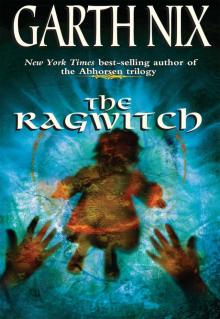 The Ragwitch
The Ragwitch Newt's Emerald
Newt's Emerald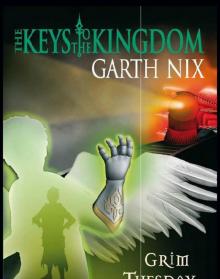 Grim Tuesday
Grim Tuesday Sabriel
Sabriel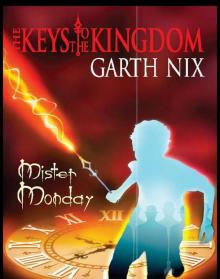 Mister Monday
Mister Monday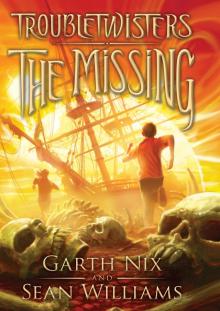 The Missing
The Missing The Fall
The Fall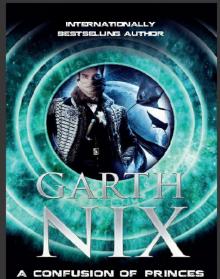 A Confusion of Princes
A Confusion of Princes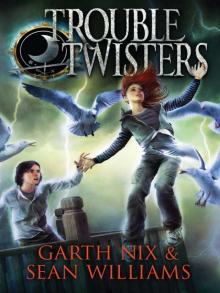 Troubletwisters
Troubletwisters Lirael
Lirael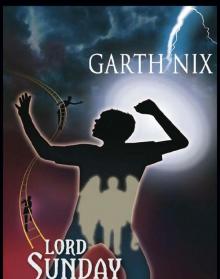 Lord Sunday
Lord Sunday Clariel
Clariel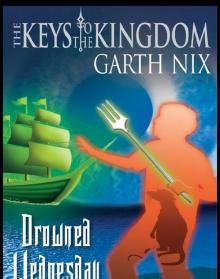 Drowned Wednesday
Drowned Wednesday Shade's Children
Shade's Children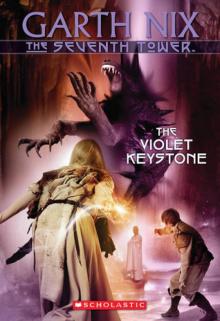 The Violet Keystone
The Violet Keystone Abhorsen
Abhorsen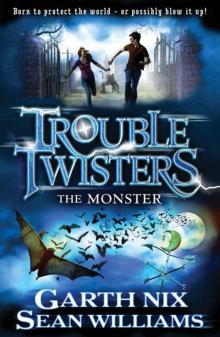 The Monster
The Monster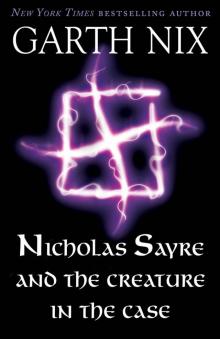 The Creature in the Case
The Creature in the Case To Hold the Bridge
To Hold the Bridge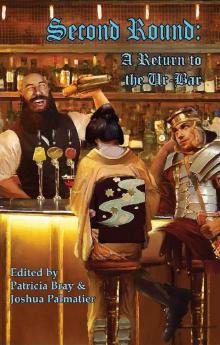 Second Round: A Return to the Ur-Bar
Second Round: A Return to the Ur-Bar Above the Veil
Above the Veil Aenir
Aenir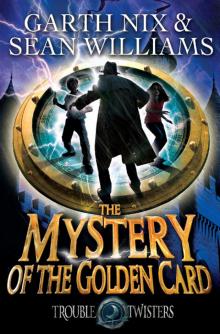 Mystery of the Golden Card
Mystery of the Golden Card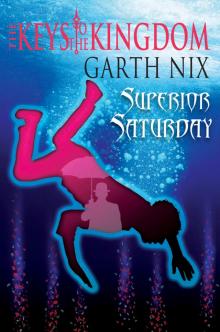 Superior Saturday
Superior Saturday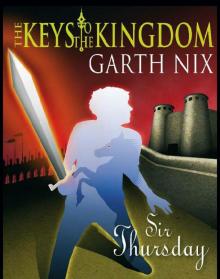 Sir Thursday
Sir Thursday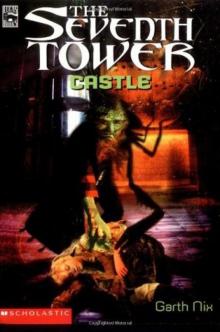 Castle
Castle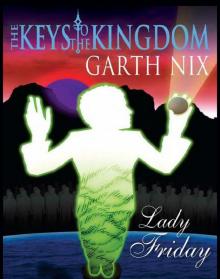 Lady Friday
Lady Friday Into Battle
Into Battle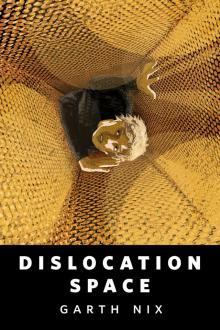 Dislocation Space
Dislocation Space Sabriel (Old Kingdom Book 1)
Sabriel (Old Kingdom Book 1) Sir Hereward and Mister Fitz Go to War Again shamf-1
Sir Hereward and Mister Fitz Go to War Again shamf-1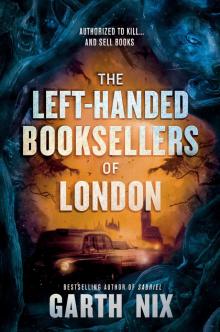 The Left-Handed Booksellers of London
The Left-Handed Booksellers of London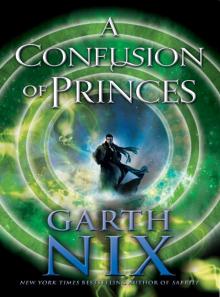 Novel - A Confusion of Princes
Novel - A Confusion of Princes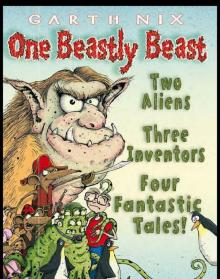 One Beastly Beast
One Beastly Beast A Suitable Present for a Sorcerous Puppet shamf-3
A Suitable Present for a Sorcerous Puppet shamf-3 Beyond the Sea Gates of the Scholar Pirates of Sarsköe shamf-2
Beyond the Sea Gates of the Scholar Pirates of Sarsköe shamf-2 Have Sword, Will Travel
Have Sword, Will Travel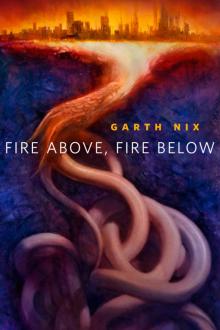 Fire Above, Fire Below
Fire Above, Fire Below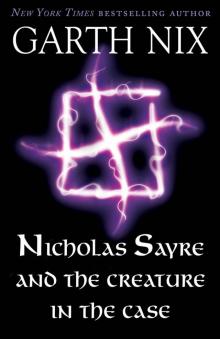 Nicholas Sayre and the Creature in the Case
Nicholas Sayre and the Creature in the Case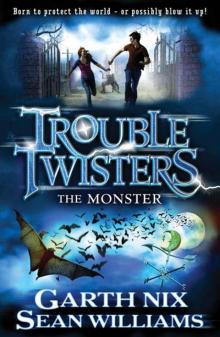 The Monster (Troubletwisters)
The Monster (Troubletwisters)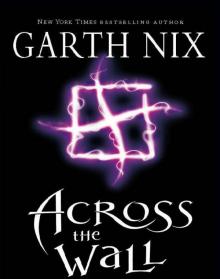 Across the Wall
Across the Wall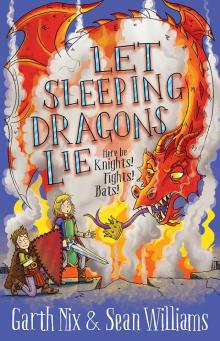 Let Sleeping Dragons Lie
Let Sleeping Dragons Lie![[Abhorsen 03a] - Across the Wall Read online](http://i1.bookreadfree.com/i2/04/12/abhorsen_03a_-_across_the_wall_preview.jpg) [Abhorsen 03a] - Across the Wall
[Abhorsen 03a] - Across the Wall